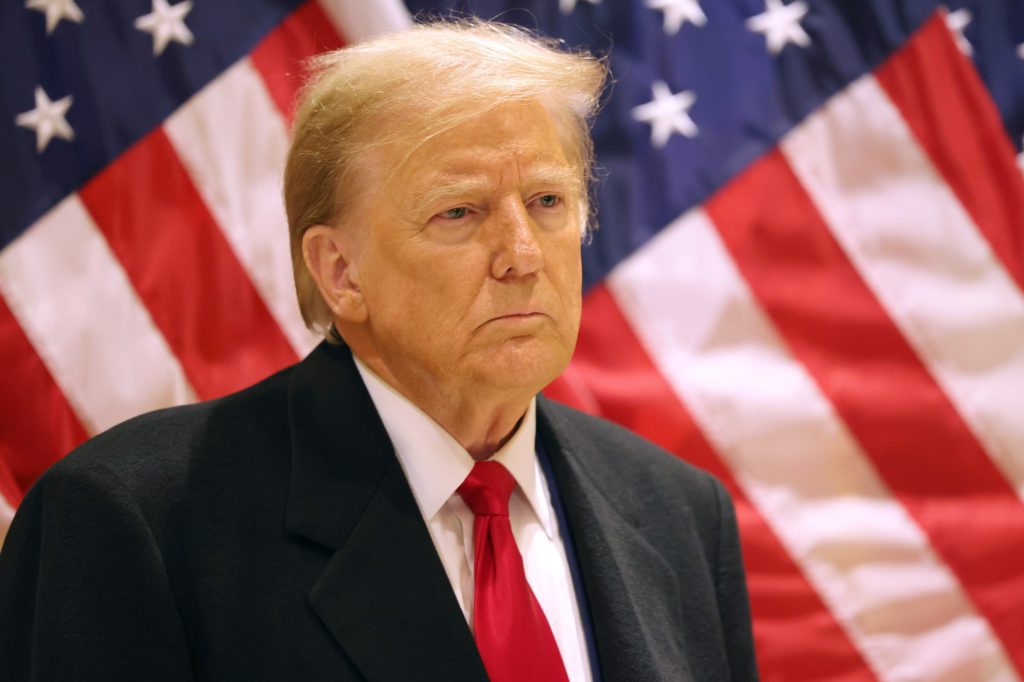By MICHAEL R. SISAK (Associated Press)
Donald Trump expressed anger on Wednesday towards the New York judge who imposed a gag order preventing him from publicly discussing witnesses, prosecutors, court staff, and jurors in his upcoming hush-money criminal trial upcoming hush-money criminal trial.
The former president took to social media to claim that the gag order was “illegal, un-American, unConstitutional” and accused Judge Juan M. Merchan of unjustly attempting to violate his First Amendment Right. He also criticized Merchan's daughter, a Democratic political consultant, for posting a photo of him behind bars on social media.
The presumptive Republican presidential nominee also criticized Merchan’s daughter, a Democratic political consultant, for posting a photo on social media of him behind bars. An account appearing to belong to Loren Merchan on X, formerly known as Twitter, has a photo illustration of an imprisoned Trump as its profile picture. Loren Merchan’s consulting firm had linked to that account in a previous social media post.
The gag order does not prevent Trump from making comments about Merchan or his family, or from criticizing Manhattan District Attorney Alvin Bragg, the elected Democrat prosecuting him.
Efforts to obtain comments from Judge Merchan, Loren Merchan, and a court spokesperson were made. Bragg’s office declined to comment on the gag order.
Trump’s reaction to the gag order was his first post on Truth Social. He had previously mentioned Merchan in a Truth Social post as a “very distinguished looking man” and a “true and certified Trump Hater.”
Merchan’s order referenced Trump’s history of “threatening, inflammatory, denigrating” remarks about people involved in his legal cases. This led to the prosecution’s request for a “narrowly tailored” gag order.
Merchan cited Trump’s various comments about him as an example of his rhetoric. The restrictions resemble those imposed by a federal appeals court panel in Trump’s Washington, D.C., election interference criminal case.
Trump’s lawyers had opposed the gag order, arguing that it would violate his free speech rights. This argument was reiterated by Trump in his Truth Social post.
Merchan had been hesitant to impose a gag order, recognizing Trump’s “special” status as a former president and current candidate. However, as the trial approached, he believed that maintaining the integrity of the case outweighed concerns about the First Amendment. He mentioned that Trump’s statements had caused fear and warranted additional security measures to protect his targets and investigate threats.
“So, let me get this straight,” Trump wrote on Truth Social, “the Judge’s daughter is allowed to post pictures of her ‘dream’ of putting me in jail, the Manhattan D.A. is able to say whatever lies about me he wants, the Judge can violate our Laws and Constitution at every turn, but I am not allowed to talk about the attacks against me, and the Lunatics trying to destroy my life and prevent me from winning the 2024 Presidential Election, which I am dominating?”
Trump suggested that the Judge may dislike him because his daughter benefits financially from her job of trying to 'Get Trump,' and when the Judge rules against him, it makes his daughter and her company wealthier. He questioned if this is acceptable.
Trump accused President Joe Biden and Attorney General Merrick Garland and their team of aggressively pursuing and tracking him all over the country, while insisting that he is innocent.
The gag order prevents Trump from making or instructing others to make public statements regarding the hush-money trial jurors and potential witnesses, including Michael Cohen and Stormy Daniels. It also prohibits any statements intended to disrupt or harass the court's staff, prosecution team, or their families.
Breaking the gag order could lead to Trump being held in contempt of court, fined, or even imprisoned.
Trump’s hush-money case revolves around allegations that he falsely recorded payments to Cohen as legal fees when they were for covering up negative stories about him during the 2016 campaign, including the $130,000 paid to Daniels to keep her claim of a previous sexual encounter with him private.
Trump formally declared that he is not guilty. In April of last year, Trump pleaded not guilty to 34 counts of falsifying business records.Falsifying business records is a serious crime that may lead to up to four years in prison, but there is no certainty that a conviction would result in incarceration. Trump and his lawyers deny the allegations of his involvement with Daniels and claim that the payments to Cohen were legitimate legal expenses, not part of any cover-up.









